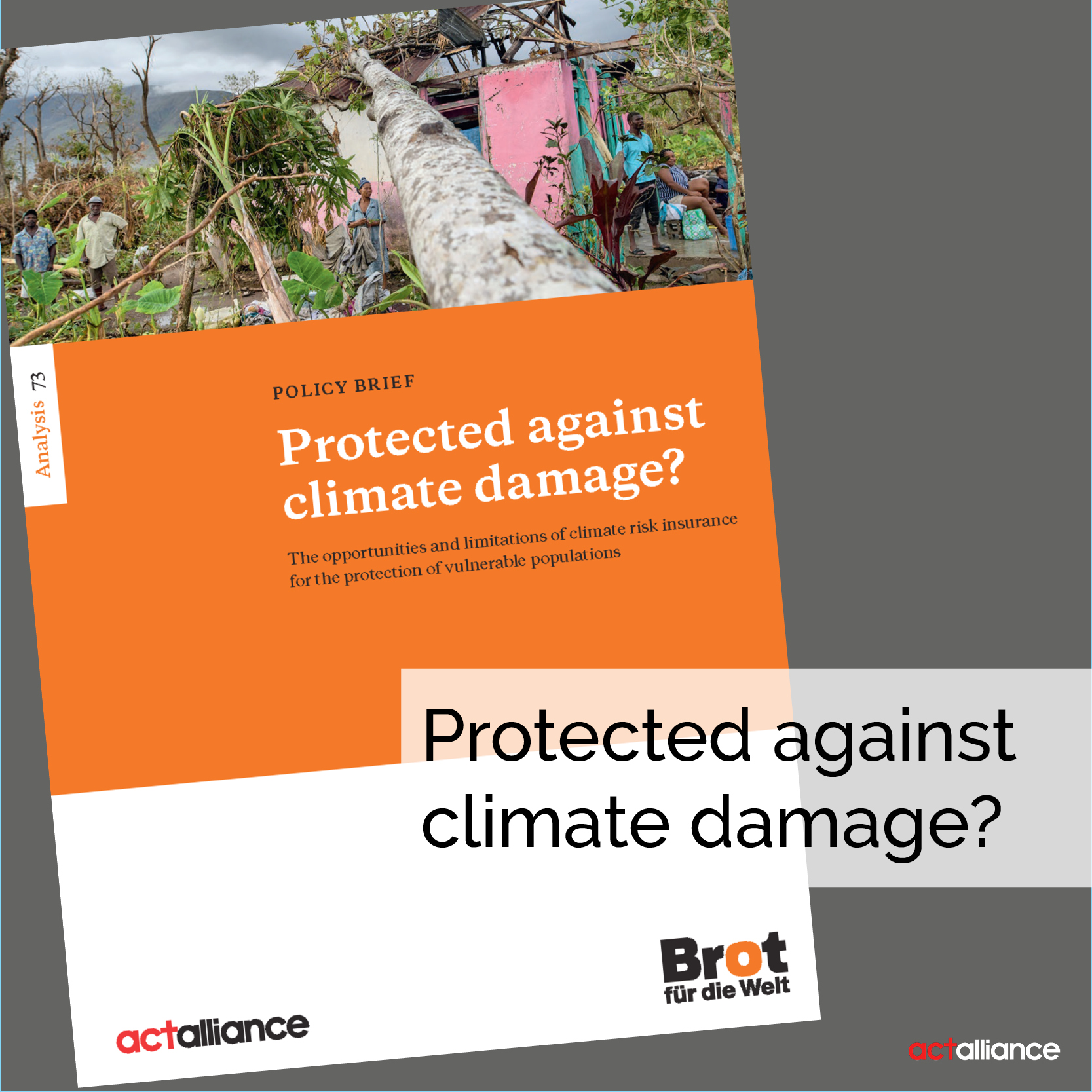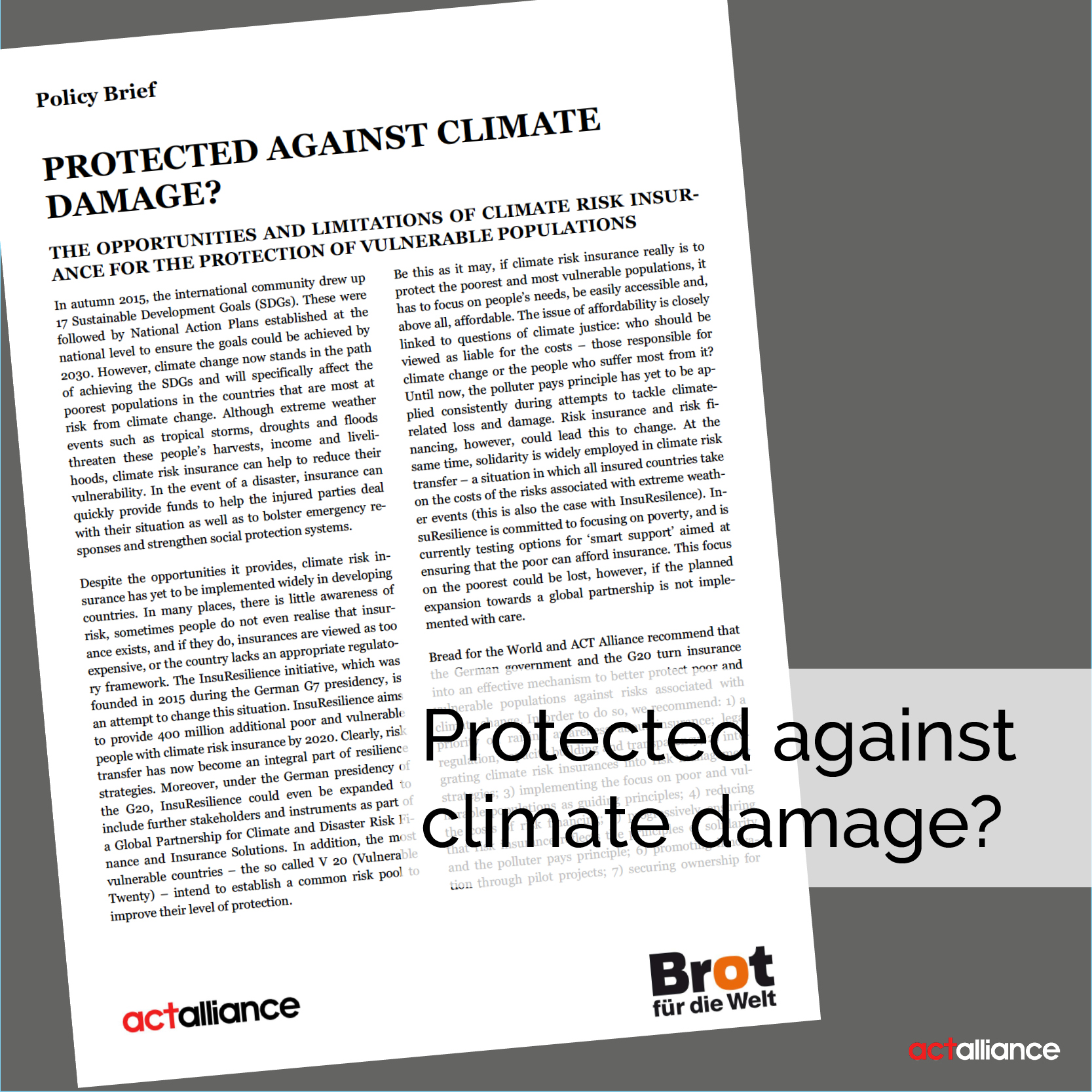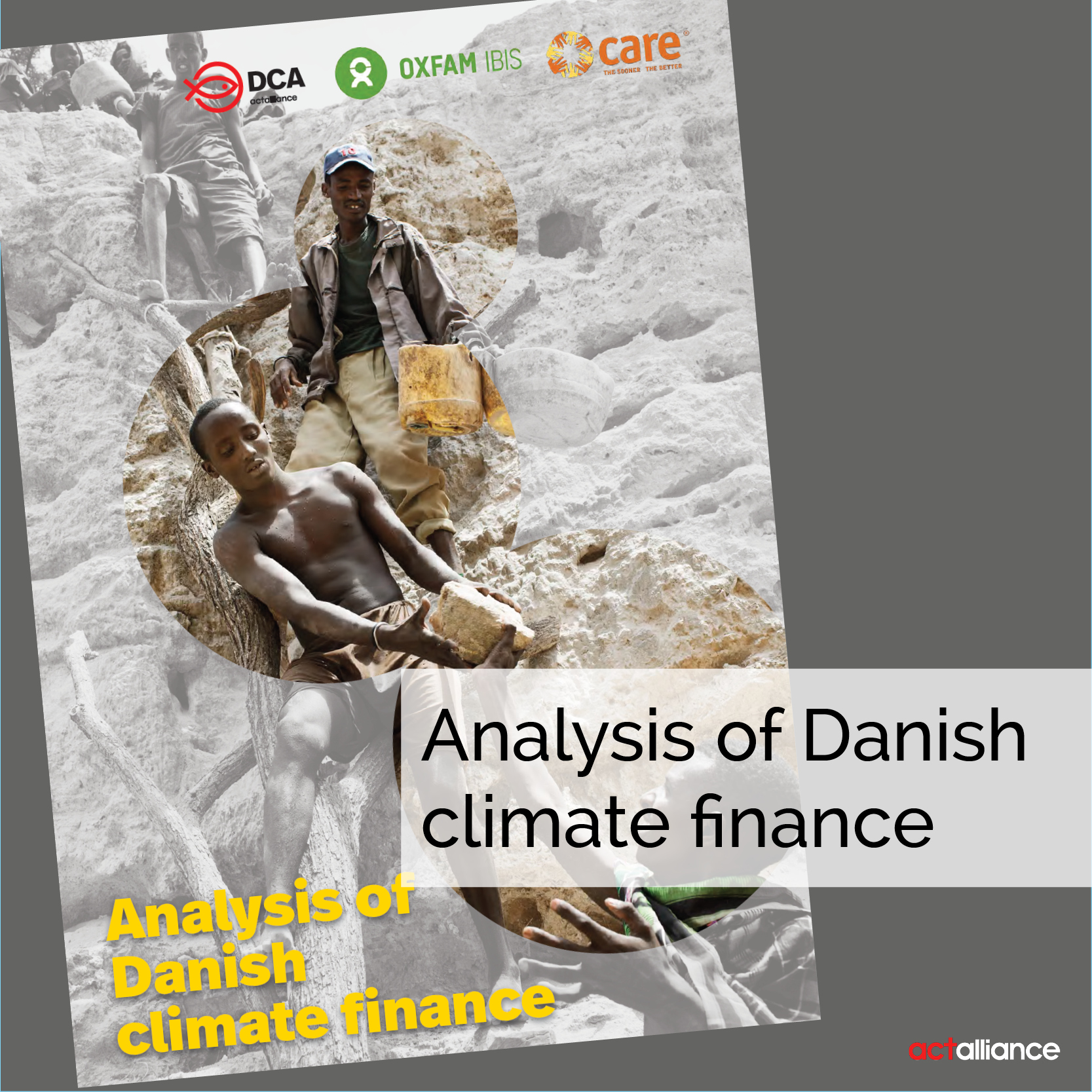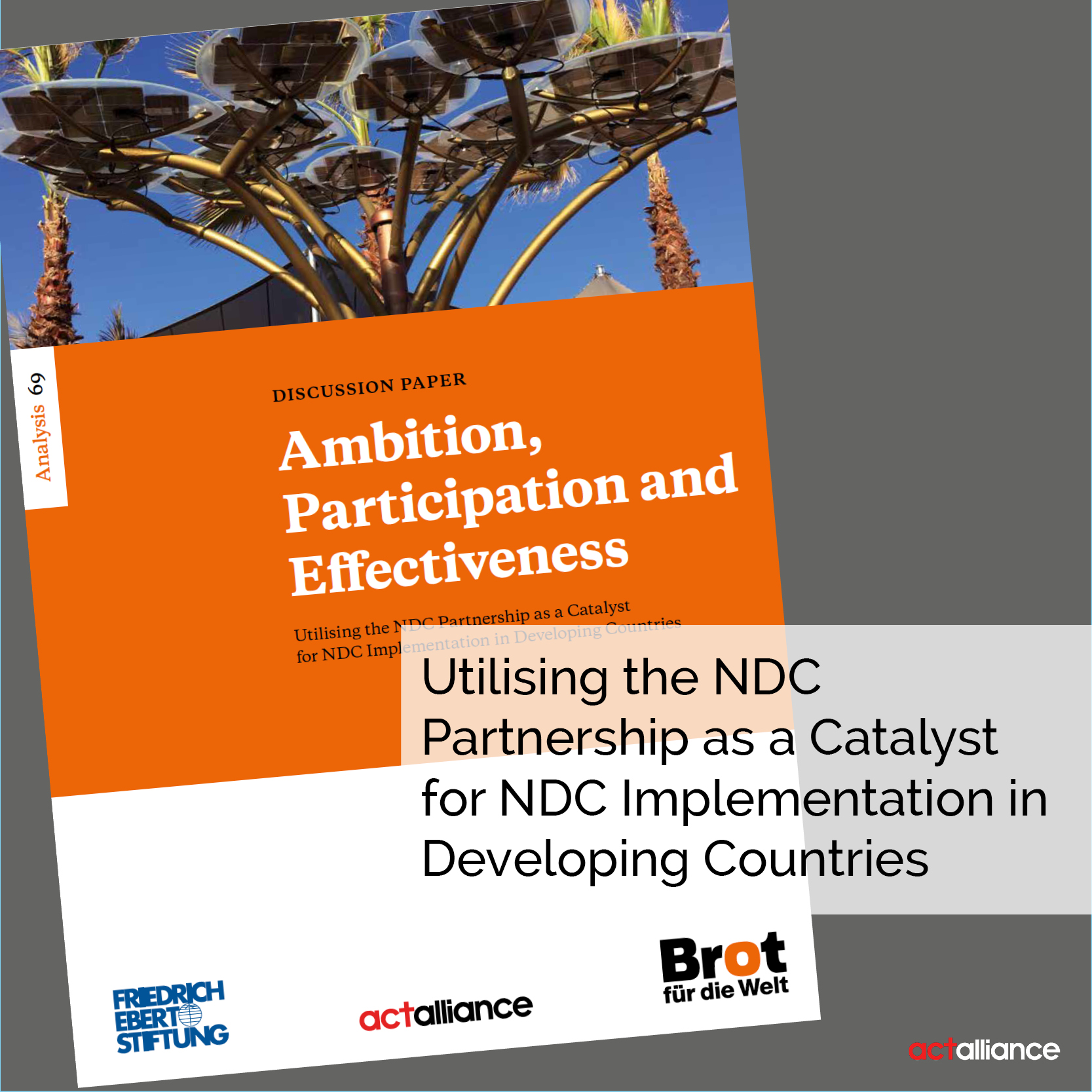Protected against climate damage?

 Climate change is not a problem of a distant future; it is already a bitter reality for millions of people around the world today. Bread for the World (Brot für die Welt) and ACT Alliance’s partner organisations report that the regions in which they operate are increasingly experiencing the impacts of climate change. These effects are even worsening in regions that have put numerous climate change adaptation measures in place.
Climate change is not a problem of a distant future; it is already a bitter reality for millions of people around the world today. Bread for the World (Brot für die Welt) and ACT Alliance’s partner organisations report that the regions in which they operate are increasingly experiencing the impacts of climate change. These effects are even worsening in regions that have put numerous climate change adaptation measures in place.
Read the publication HERE
Protected against climate damage? – Policy brief

In autumn 2015, the international community drew up 17 Sustainable Development Goals (SDGs). These were followed by National Action Plans established at the national level to ensure the goals could be achieved by 2030. However, climate change now stands in the path of achieving the SDGs and will specifically affect the poorest populations in the countries that are most at risk from climate change. Although extreme weather events such as tropical storms, droughts and floods threaten these people’s harvests, income and livelihoods, climate risk insurance can help to reduce their vulnerability. In the event of a disaster, insurance can quickly provide funds to help the injured parties deal with their situation as well as to bolster emergency responses and strengthen social protection systems.
Read the publication HERE
Protected against climate damage? – Policy brief
In autumn 2015, the international community drew up 17 Sustainable Development Goals (SDGs). These were followed by National Action Plans established at the national level to ensure the goals could be achieved by 2030. However, climate change now stands in the path of achieving the SDGs and will specifically affect the poorest populations in the countries that are most at risk from climate change. Although extreme weather events such as tropical storms, droughts and floods threaten these people’s harvests, income and livelihoods, climate risk insurance can help to reduce their vulnerability. In the event of a disaster, insurance can quickly provide funds to help the injured parties deal with their situation as well as to bolster emergency responses and strengthen social protection systems.
Read the publication HERE
Protected against climate damage? – Policy brief
In autumn 2015, the international community drew up 17 Sustainable Development Goals (SDGs). These were followed by National Action Plans established at the national level to ensure the goals could be achieved by 2030. However, climate change now stands in the path of achieving the SDGs and will specifically affect the poorest populations in the countries that are most at risk from climate change. Although extreme weather events such as tropical storms, droughts and floods threaten these people’s harvests, income and livelihoods, climate risk insurance can help to reduce their vulnerability. In the event of a disaster, insurance can quickly provide funds to help the injured parties deal with their situation as well as to bolster emergency responses and strengthen social protection systems.
Read the publication HERE
Analysis of Danish climate finance
Climate finance is one of the thorniest issues on the UN climate change agenda. Developed countries claim to be complying with their financial commitments, while developing countries continue to ask where the money is. To overcome this recurring discussion, the parties must first hammer out and agree on some rules for the accounting of climate finance.
We, the undersigned three Danish NGOs, namely CARE Denmark, DanChurchAid and Oxfam IBIS, decided to commission the present report. We wanted to learn more about Danish climate finance, whose reporting methods are adhering to OECD guidelines and to standard practices among developed countries in general. Consequently, the conclusions are relevant for a much broader audience than our three organisations. Understanding the limitations of current reporting rules and practices is an important step in designing better climate finance accounting modalities for the future. This is already on the agenda of the UN climate negotiations. Accordingly, the recommendations of this report serve to illuminate an important debate. The conclusions of the report give rise to four recommendations on how to proceed in these difficult negotiations.
| Birgitte Qvist Sørensen | Niels Tofte | Mie Roesdahl |
| Generalsekretær | Generalsekretær | Generalsekretær |
| DanChurchAid (ACT Alliance) | CARE Denmark | Oxfam IBIS |
Read the pubblication HERE
Analysis of Danish climate finance
Climate finance is one of the thorniest issues on the UN climate change agenda. Developed countries claim to be complying with their financial commitments, while developing countries continue to ask where the money is. To overcome this recurring discussion, the parties must first hammer out and agree on some rules for the accounting of climate finance.
We, the undersigned three Danish NGOs, namely CARE Denmark, DanChurchAid and Oxfam IBIS, decided to commission the present report. We wanted to learn more about Danish climate finance, whose reporting methods are adhering to OECD guidelines and to standard practices among developed countries in general. Consequently, the conclusions are relevant for a much broader audience than our three organisations. Understanding the limitations of current reporting rules and practices is an important step in designing better climate finance accounting modalities for the future. This is already on the agenda of the UN climate negotiations. Accordingly, the recommendations of this report serve to illuminate an important debate. The conclusions of the report give rise to four recommendations on how to proceed in these difficult negotiations.
| Birgitte Qvist Sørensen | Niels Tofte | Mie Roesdahl |
| Generalsekretær | Generalsekretær | Generalsekretær |
| DanChurchAid (ACT Alliance) | CARE Denmark | Oxfam IBIS |
Read the pubblication HERE
Analysis of Danish climate finance

Climate finance is one of the thorniest issues on the UN climate change agenda. Developed countries claim to be complying with their financial commitments, while developing countries continue to ask where the money is. To overcome this recurring discussion, the parties must first hammer out and agree on some rules for the accounting of climate finance.
We, the undersigned three Danish NGOs, namely CARE Denmark, DanChurchAid and Oxfam IBIS, decided to commission the present report. We wanted to learn more about Danish climate finance, whose reporting methods are adhering to OECD guidelines and to standard practices among developed countries in general. Consequently, the conclusions are relevant for a much broader audience than our three organisations. Understanding the limitations of current reporting rules and practices is an important step in designing better climate finance accounting modalities for the future. This is already on the agenda of the UN climate negotiations. Accordingly, the recommendations of this report serve to illuminate an important debate. The conclusions of the report give rise to four recommendations on how to proceed in these difficult negotiations.
| Birgitte Qvist Sørensen | Niels Tofte | Mie Roesdahl |
| Generalsekretær | Generalsekretær | Generalsekretær |
| DanChurchAid (ACT Alliance) | CARE Denmark | Oxfam IBIS |
Read the pubblication HERE
Ambition, Participation and Effectiveness
Now that the Paris Agreement has established goals and a framework for the long-term global response to climate change, the time has come for its fast, ambitious and effective implementation. If temperature increase is to be kept below 1.5°C, the appropriate policy course must be firmly embedded within the next ten years.
This brochure sets out practical proposals for the shaping of the NDC Partnership with a view to unlocking its transformative potential and enabling it to become a catalyst for ambition, effectiveness and participation in NDC implementation in developing countries.
Read the document HERE
Ambition, Participation and Effectiveness
Now that the Paris Agreement has established goals and a framework for the long-term global response to climate change, the time has come for its fast, ambitious and effective implementation. If temperature increase is to be kept below 1.5°C, the appropriate policy course must be firmly embedded within the next ten years.
This brochure sets out practical proposals for the shaping of the NDC Partnership with a view to unlocking its transformative potential and enabling it to become a catalyst for ambition, effectiveness and participation in NDC implementation in developing countries.
Read the document HERE
Ambition, Participation and Effectiveness

Now that the Paris Agreement has established goals and a framework for the long-term global response to climate change, the time has come for its fast, ambitious and effective implementation. If temperature increase is to be kept below 1.5°C, the appropriate policy course must be firmly embedded within the next ten years.
This brochure sets out practical proposals for the shaping of the NDC Partnership with a view to unlocking its transformative potential and enabling it to become a catalyst for ambition, effectiveness and participation in NDC implementation in developing countries.
Read the document HERE
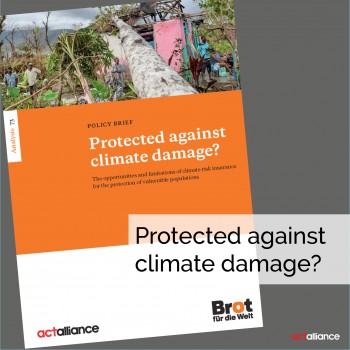 Climate change is not a problem of a distant future; it is already a bitter reality for millions of people around the world today. Bread for the World (Brot für die Welt) and ACT Alliance’s partner organisations report that the regions in which they operate are increasingly experiencing the impacts of climate change. These effects are even worsening in regions that have put numerous climate change adaptation measures in place.
Climate change is not a problem of a distant future; it is already a bitter reality for millions of people around the world today. Bread for the World (Brot für die Welt) and ACT Alliance’s partner organisations report that the regions in which they operate are increasingly experiencing the impacts of climate change. These effects are even worsening in regions that have put numerous climate change adaptation measures in place.